- Home
- Michael Dobbs
A Ghost at the Door Page 12
A Ghost at the Door Read online
Page 12
The diners, about twenty in number and all in their gowns, wound their way up a narrow stone staircase until in a single step they had burst upon what to Harry seemed like the stage of an awesome theatre. The High Table on which they were about to dine stood on a raised platform overlooking a Tudor hall with soaring roof timbers cut from dark oak, ornate ancient windows that glittered in the evening light and, in the heart of the hall, three rows of age-polished tables. Chattering undergraduates were already seated. It was like a scene from Hogwarts, which even Sir Cecil would admit was no mere coincidence: this was where the set designers had found their inspiration. The ancient walls of Hogwarts had been covered with portraits of wizards; here there were monarchs and prime ministers and imperial viceroys and bishops. Despite its pageantry, this place had seen its own share of dark practices. It was where the deluded Charles I had convened his parliament after being forced to flee London. It was also where, a little later, Cromwell’s victorious troops had stabled their horses as an act of contempt. Yet the ancient customs survived. The grace, a lengthy one, was delivered in Latin.
Sir Cecil sniffed cautiously at the claret. ‘Your father would have supped better, Harry,’ he declared. ‘In his day the college cellars were renowned. Source it, lay it down, wait for the right moment. Time was meaningless – until we discovered one of the undergraduates was selling large quantities of our vintage port outside college at one helluva markup. We encourage enterprise, of course, but there are limits.’
‘What became of him?’
‘The young man? Governor of the Bank of England.’ He shook his head in sorrow. ‘Our fault, of course. We became too indulgent. Too set in our ancient ways. We should have swept places like this away when we were in government, Harry, don’t you think? After all, how are we to justify it? Oh, a fine history, that I grant, but what has this place achieved recently?’ He sipped at his claret, seeming still uncertain.
‘Apart from Albert Einstein, of course,’ Katherine Pontefract chipped in, almost as an afterthought.
‘And John Gurdon. The biologist chap. Won a Nobel Prize the other year, didn’t he?’ McQuarrel added.
Sir Cecil waved a languid hand. ‘Auberon Waugh, W. H. Auden, William Walton – but I don’t suppose they count.’
‘The last Archbishop of Canterbury, he was one of ours.’
‘And that Indian fellow who runs Tata Steel.’
‘Going to rack and ruin,’ Sir Cecil concluded.
‘Except for a few Olympic athletes, I suppose. And the chap who worked out the connection between smoking and cancer,’ Pontefract said.
‘Yes, damn him.’
‘Enough!’ Harry acknowledged, waving his fork and smiling. This was clearly a routine they enjoyed. ‘I get the point.’
‘And there was your father, of course,’ McQuarrel interjected, more softly.
‘This place would have fallen down like rotten Cheddar on our heads long ago without people like him,’ Pontefract said. ‘Raise young minds and repair old buildings, that’s what he helped us do.’
‘I’d never seen him in that light,’ Harry said, struggling with his food; he still hadn’t mastered the art of eating with his arm in a cast.
‘There was something special about those who came here in the sixties,’ Sir Cecil said. ‘What made them different, I wonder? Something to do with the rejection of dreary postwar conformity, perhaps, the embracing of new ideas.’
‘And each other,’ Pontefract added, arching an over-plucked eyebrow.
‘But it was more than that,’ McQuarrel said. ‘I was a junior research fellow at Brasenose at the time and those friendships weren’t simply struck, they also stuck, had a habit of enduring.’
‘I don’t think my father had any close friendships,’ Harry said.
‘But you’re wrong, Harry,’ McQuarrel replied. ‘I like to think that I was his friend, and there were many closer than me.’
It was after they were done with dinner and back in the Senior Common Room that Harry produced the photo from his pocket. He laid it on the coffee table around which they had gathered and tried with less than total success to smooth out the conspicuous central fold. ‘These were some of his friends. I wonder if you can help me.’
‘Damn, but you look just like him,’ Pisani said.
Harry frowned. He was fed up with hearing that. ‘I know who three of these are’ – he pointed to his father, Susannah Ranelagh and al-Masri – ‘but as for the other four . . .’
‘Why, that’s surely Christine Leclerc,’ Pisani interrupted, stabbing at one of the women in the photo with his finger. ‘Christine Berserk, we used to call her. Hell of a woman, even in her fifties. Fine features, look at those cheekbones. Unmistakable. Didn’t you ever meet her, Harry?’
He shook his head.
‘The most senior woman in the European Commission, she was. Immensely powerful. Could cut a budget proposal in half at fifty paces.’
‘And now?’
‘Oh, dead and gone.’
Harry’s coffee suddenly tasted intensely bitter. Another one who hadn’t made it. ‘How?’
‘Plane crash. Private jet on her way back from the Sudan on some aid mission. Came down in a freak storm. Don’t you remember? Perhaps not, it was probably before you got into politics.’
‘And this rather righteous-looking specimen’ – McQuarrel indicated the figure on the far right – ‘is surely another of our old boys, Randall Wickham, the Bishop of Burton. Yes, give him a haircut and a mitre and a few decades and that’s Randy. See, he’s lost the top of his little finger, bitten off by a Yorkshire terrier when he was a kid. Always notice that when I see him giving the benediction.’
‘You know him?’
‘Not desperately. He delivers a sermon in the cathedral here occasionally. Enjoys his college port.’
‘Still alive and kicking?’
‘Well, preaching, at least. Retired by now, I suspect.’
‘My father – and a bishop?’ Harry shook his head in disbelief.
‘Forgiveness on tap,’ McQuarrel said, in a tone that suggested he wasn’t being flippant.
‘A final drink, J?’ Kaminski asked as Jemma shuffled together her papers at the end of the meeting.
‘For old times’ sake?’
‘Something like that.’
She hesitated. ‘OK.’
He had been full of humour and insight as Hayley the convener had sniffled her way through the agenda and her latest allergy. Steve didn’t deserve unnecessary grief. And he seemed in excellent shape, the thigh that in the crush had nestled up against hers still rock-hard from his rugby and squash. She remembered everything about his body being gratifyingly solid. That played no part in her decision, of course, and no part at all in her barely noticing that their final drink had been followed by another. She was relaxing, having a good time. Too good a time. His eyes were full of music, and mischief. Typical bloody Steve.
‘So what about the man you’re dating?’ he asked.
‘Engaged to, remember.’
‘Oh, that’s right. Sorry. But you’re not wearing a ring.’
‘No.’
‘I hope he knows how lucky he is. Name?’
‘Harry.’
‘Reliable sort?’
‘Next question.’
‘So where is he?’
‘Off getting stuck up his family tree, I think.’
‘Whoops. Choppy water?’
‘We’re in a relationship, stupid.’
‘Ah, I see.’ And he had. Very deliberately his hand reached out and went to hers. ‘You’re a special lady, J, deserve nothing but the best. I so hope you get it.’
Her own hand was growing warm beneath his; she didn’t move it, not even when it closed around hers, and that wasn’t the only part of her that was beginning to react.
‘And, J, if ever you feel like getting a second opinion . . .’
Without thinking, she sprang to her feet, knocking over her beer in her haste to get
away. She didn’t bother to make excuses or say goodbye, simply ran for the door. She was confused, and not just from the beers. She knew what he was going to suggest next. For old times’ sake. That was why she panicked, because, right at that moment, she hadn’t any idea what she would say in reply.
CHAPTER TWELVE
Harry and Alexander McQuarrel sat on the steps of the Old Library, where, more than fifty years before, his father had stood among his friends to have his Freshers photograph taken. It was late, the towering Corinthian columns staring down upon a Peckwater Quad that had fallen almost silent as the last of the summer evening faded from the sky and the hour nudged midnight. Lights were still blazing from the windows of students’ rooms, splashing across the grass, just as Johnnie would have remembered.
‘Why are you chasing your father so hard, Harry?’ McQuarrel asked, rolling the tumbler of port he had brought between the palms of his hands. The tumbler was excessive, but so was the atmosphere, deep, cloistered by the walls of the quad, almost conspiratorial.
Harry clung onto his own tumbler with his one free hand and took a while before he replied. ‘It’s not easy to put into words, Alex. I never knew him well. And I know it sounds like a pathetic cliché but I need to know more about him in order to know myself.’
‘You don’t know yourself?’
‘You think you do, until you get to see yourself through the eyes of others.’ Particularly Jemma, of course. ‘Sometimes you discover you’re not the answer to every prayer.’
‘I’ve kept track of you over the years.’
‘Why?’
‘Natural interest, knowing your father. Anyway, it hasn’t been too difficult. I can’t remember a year when you weren’t somewhere in the headlines. I even read that you get a personal Christmas card from the Queen.’
‘Then you know more about me than I know about my father.’
‘Johnnie was . . .’ McQuarrel eased his elderly frame on the hard stone as he stretched for the right phrase. ‘A complicated man.’
‘He seemed to have had many different lives.’
‘He was full of imagination. Quite brilliant with it.’
‘He drank.’
‘Made a fortune, of course.’
Harry swivelled so that he could confront his new friend. ‘How, Alex? How did he make all that money?’
‘He was – what’s the term? – a financial consultant.’
‘And what the hell did that mean?’
‘He gambled. Bet against the system. Spotted winners before anyone else and sold short those that were headed for a fall.’
‘But how?’
‘I told you, he was brilliant. Not only instinctively but intellectually. He came back here often, and you know what the Senior Common Room is like, stuffed full of men and women who are the brightest in their field yet who are strangely and sometimes deliberately cut off from reality. You can’t dine off college silver every night and still claim to have the common touch. And we do so love a gossip. So when your father arrived with a glass in hand and laughter in his eyes, and with all his tales of the outside world, we’d fall into his arms.’
‘But what would he get from a professor of Ancient Greek?’
‘Not a lot, perhaps. But I’m a biochemist, a Senior Fellow – all but retired now, of course, very much Emeritus, but alongside the academic work I was involved with various research companies. Cutting-edge stuff. Trying to find out how we can live for ever. The graveyards are full of my failures.’ He seemed to find it a wry joke. ‘But eternal life is what we’re promised and what many will pay a fortune for in their vain attempt to achieve it. Johnnie understood all that and had an inexhaustible capacity for turning people’s hopes and fears into money. So he would come here, and many other places like this, and listen. And he had a very good ear. Soaked up all our braggadocio and intellectual conceits, grabbed every morsel of information. Biochemistry, aerospace engineering, quantitative finance, computer science, we’ve got the lot. And the very best. People who advise corporations and governments around the world, who start revolutions not from behind barricades but in boardrooms and labs and from computer silos. Johnnie knew that. He would stand beside the fire in the Senior Common Room and make love to us all.’
‘No one minded?’
‘Oh, a few, but he handled us so gently, and we’re vain, we do so love to lift our skirts. Particularly when we’ve had a drink, and, by God, did Johnnie know how to hammer the drink.’ He raised his glass in silent salute. ‘Anyway, he made sure we shared in his success. He would always come back with a large cheque. We’re dreamers here, Harry, but dreams cost money and you’d be surprised what people will do to pursue their dreams.’
‘His dream was money,’ Harry whispered.
‘He was a man with many facets.’
‘A rough diamond.’
‘I found him rather polished.’
‘Alex, you said you knew me when I was eight.’
‘Around that age.’
‘So . . .’ There was a slight glitch in Harry’s voice. ‘You must have known my mother.’
McQuarrel paused, then nodded, slowly, as though it took a considerable effort, and stared deep into his glass. ‘She had a hard road to walk.’ He looked up, his eyes almost pleading for Harry not to press him. ‘I didn’t know her well. I’m sorry.’ A heavy silence stretched between them in the darkness. ‘Don’t judge too harshly, Harry. No one can know the truth of such circumstances, even those who are involved in it.’
As he stared forlornly into the darkness two men and a young woman burst from a staircase on the far side of the quad, spilling onto the lawn in post- or pre-coital exuberance. From somewhere near at hand a clock bell chimed midnight. Harry glanced at his father’s wrist-watch: six minutes slow. He advanced it seven.
‘I must go, Harry. Dammit, I’ve spent so long sitting here I feel like Methuselah. Are you coming?’
Harry shook his head. ‘This is where he sat. Got drunk.’ He stared into the past. ‘I think I’ll stay awhile.’
McQuarrel rose stiffly, testing his legs. ‘Don’t be too hard on your father, Harry. It never does to disinter the dead – you’ll find nothing but corruption. Better to move on.’
‘Jemma told me much the same, too.’
‘Then make it unanimous. I’ll see you in the morning.’ The old man began to walk away.
‘Oh, one last thing, Alex. Does the name Susannah Ranelagh mean anything to you?’
McQuarrel stopped, turned slowly. ‘No, nothing,’ he said from the darkness, and disappeared.
Jemma woke, warm, damp, her breasts cupped in his hands. ‘Oh, fuck!’ she muttered.
Beside her Steve stirred.‘Morning,’ he whispered, and kissed her shoulder. Then he began nibbling her neck.
She pushed him away. ‘Fuck!’ she said again, more loudly. She wanted to blame him but she couldn’t: it was all her fault. She’d felt so childish about fleeing from the pub, so when he had caught up with her on the pavement outside she’d apologized.
‘Why did you run?’ he’d asked.
That was when she burst into tears. She didn’t know why, not for sure. She was confused, in need, wanted a shoulder to cry on and hands that would smooth away all her creases and cares. She wanted Harry, the old Harry, not this new one who’d come back broken and harsh from Bermuda, but neither Harry had been there on the pavement when she’d needed him. So she’d made do with Steve. Distraction. And it had worked, for a few hours. He had brought her back to his place and slipped off her clothes, touched her so softly she scarcely knew which part of his own body he was using, finding those hidden places, reminding her of all the reasons why she’d been with him in the first place. It was only as she woke the following morning that she remembered all the reasons she’d decided she should stop. She knew she would go to his bathroom, reach for his brush and find another woman’s hair embedded in it. Discover spare toothbrushes hidden away. Yet she wasn’t angry with Steve, not as angry as she was wi
th Harry. Steve hadn’t promised her anything other than a great time, and he’d delivered, while Harry . . .
Getting laid by Steve wasn’t the answer to anything, she knew that, but she wasn’t any longer sure that Harry was, either. At least Steve wasn’t complicated. His hands were back on her breasts and something was digging into the small of her back.
‘So here’s the deal, J. You can have breakfast in bed. Or breakfast in the kitchen.’
She turned, felt his body against hers. ‘After last night I’m surprised you’ve still got an appetite.’
‘I’ve got an appetite. I need an answer.’
‘Then both,’ she said. ‘I’ll take both.’
Summer was spilling across the great quad, with fingers of early-morning sunlight weaving rainbows through the spray thrown from the fountain. Harry let it settle on his cheeks. He remembered tales his father had told about late nights that ended with his being thrown into this fountain, dressed in his dinner jacket, to swim among the spotted carp with their bulging bellies that lurked beneath the tangled carpet of lily leaves.
‘Maybe the fish remember Johnnie,’ a voice said at Harry’s ear. He turned to find McQuarrel at his shoulder. ‘Carp can live to be seventy, apparently,’ McQuarrel added.
‘The bloody fish know more than I do,’ Harry muttered.
‘What do they say, Harry? “The evil that men do lives after them; the good is oft interred with their bones”. Mark Antony’s oration over Caesar’s body. I’m not the greatest fan of Shakespeare – overwritten, too many words – but there are moments when he gets it. I wonder what any of our lives will look like in hindsight. Flaws are cut in stone while our merits are like footprints in the sand.’
‘So let it be with Johnnie, is that it?’ Harry said, echoing the play’s lines.
‘He never much seemed to worry about death, not that I remember. He was all about the moment and living it to the full. “Die happy,” he used to say. “It’s a once-in-a-lifetime thing.” He did so like his bons mots. I hope he meant it.’

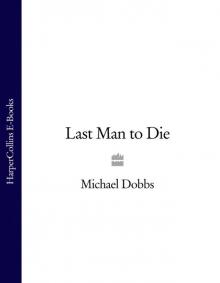 Last Man to Die
Last Man to Die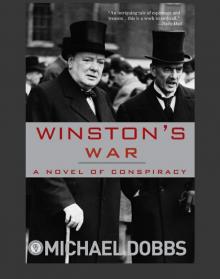 Winston's War
Winston's War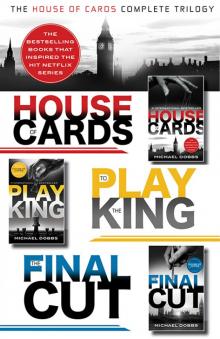 The House of Cards Complete Trilogy
The House of Cards Complete Trilogy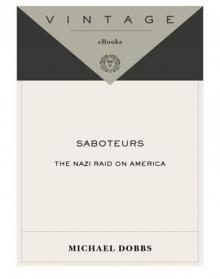 Saboteurs
Saboteurs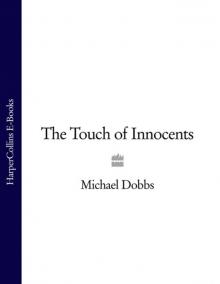 The Touch of Innocents
The Touch of Innocents WC02 - Never Surrender
WC02 - Never Surrender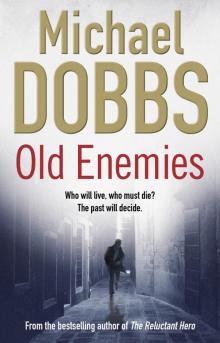 Old Enemies
Old Enemies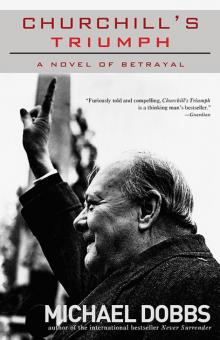 Churchill's Triumph
Churchill's Triumph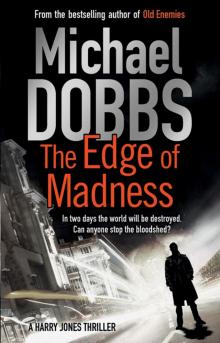 The Edge of Madness
The Edge of Madness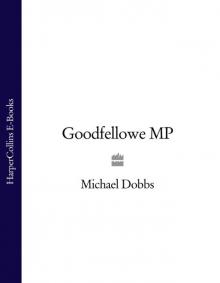 Goodfellowe MP
Goodfellowe MP The Final Cut
The Final Cut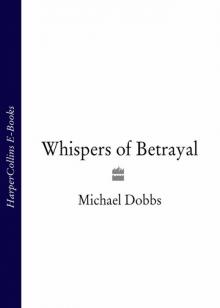 Whispers of Betrayal
Whispers of Betrayal Churchill's Hour
Churchill's Hour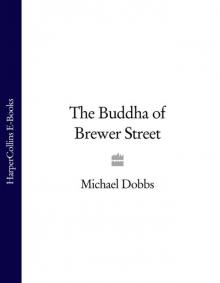 The Buddha of Brewer Street
The Buddha of Brewer Street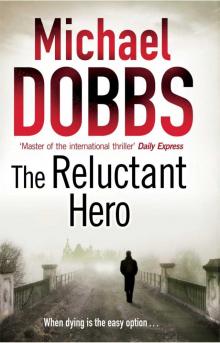 The Reluctant Hero
The Reluctant Hero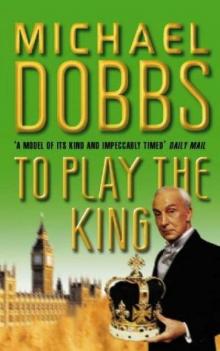 To Play the King
To Play the King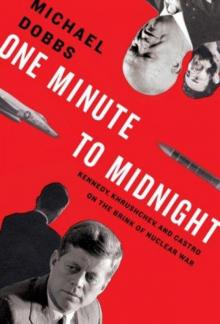 One minute to midnight
One minute to midnight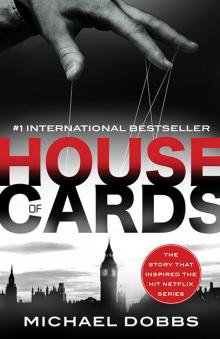 House of Cards
House of Cards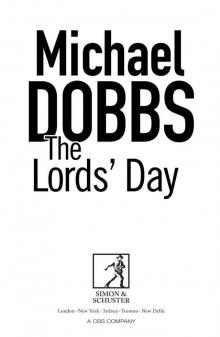 The Lords' Day (retail)
The Lords' Day (retail)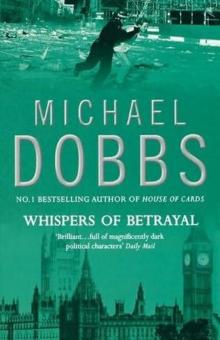 Whispers of betrayal tg-3
Whispers of betrayal tg-3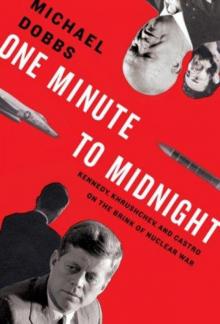 One minute to midnight: Kennedy, Khrushchev, and Castro on the brink of nuclear war
One minute to midnight: Kennedy, Khrushchev, and Castro on the brink of nuclear war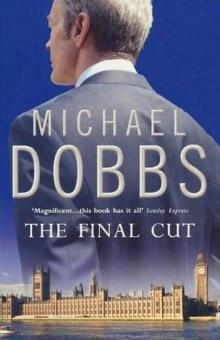 The Final Cut fu-3
The Final Cut fu-3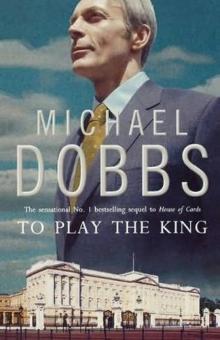 To play the king fu-2
To play the king fu-2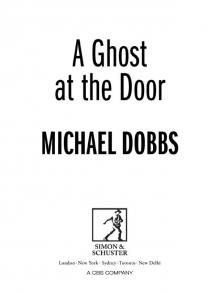 A Ghost at the Door
A Ghost at the Door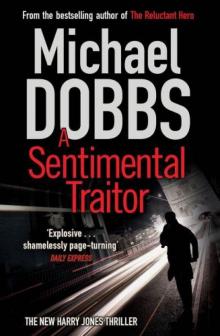 A Sentimental Traitor
A Sentimental Traitor